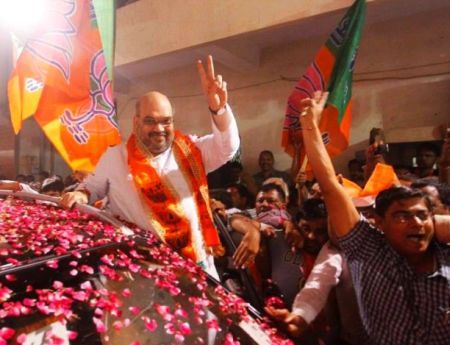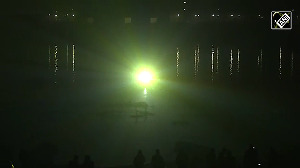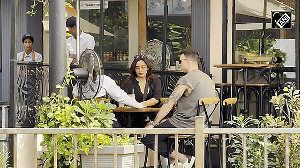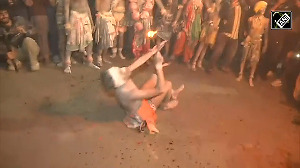 Meets leaders from Haryana, Maharashtra, Jharkhand, and Jammu and Kashmir; party keen to form government in Delhi.
Meets leaders from Haryana, Maharashtra, Jharkhand, and Jammu and Kashmir; party keen to form government in Delhi.
The Bharatiya Janata Party is preparing its strategy for the upcoming assembly elections. Over the past two days, party president Amit Shah has held stock-taking meetings with central coordinators and BJP leaders from Haryana, Maharashtra, Jharkhand and Jammu and Kashmir.
There is also the likelihood that BJP might attempt to form a government in Delhi. The party claims to be confident of receiving support from “disillusioned” Congress MLAs.
Former Rashtriya Swayamsevak Sangh spokesperson Ram Madhav has been a notable presence during Shah’s meetings with leaders from states where assembly elections are scheduled. Madhav took a position in the BJP only last week and is expected to be the bridge between the party and the RSS. Currently, general secretary (organisation) Ram Lal, a former RSS pracharak (whole timer), handles the job.
Assembly elections to all four states could take place simultaneously as early as October-November. The terms of Jharkhand and Jammu & Kashmir assemblies expire only in January next year; that of Haryana and Maharashtra end in end-October and first week of December, respectively.
Chief ministers of Rajasthan, Madhya Pradesh and Chhattisgarh have also come for consultations, as well as to congratulate Shah on becoming the party chief. Rajasthan CM Vasundhara Raje met Shah on Tuesday, while Madhya Pradesh CM Shivraj Singh Chouhan and Chhattisgarh’s Raman Singh called on Shah on Wednesday.
As for Delhi, newly appointed BJP chief Satish Upadhyay indicated on Wednesday the party might not be averse to forming a government. The Delhi assembly has been in suspended animation ever since the Arvind Kejriwal-led Aam Aadmi Party quit in mid-February this year.
Upadhyay has held two meetings with party MLAs and MPs. Not many MLAs are keen to face yet another election. Shah, in consultation with Prime Minister Narendra Modi, is to take a final call on the issue. The party might put forth Delhi BJP leader Jagdish Mukhi’s name for the CM post.
“We will consider it (formation of government) provided Lt Governor Najeeb Jung calls us,” said Upadhyay on Wednesday. The BJP emerged as the single-largest party in Delhi in the assembly elections in December 2013, winning 31 seats in the 70-member assembly. Its ally Shiromani Akali Dal ally was victorious in one seat.
The alliance was four short of the majority mark and refused to form the government by adopting “unfair means”. AAP with 28 MLAs formed the government with the support of Congress’s eight MLAs. AAP's current strength is 27 after it expelled its MLA Vinod Kumar Binny.
The BJP alliance’s numbers came down to 29 in the House in May after three of its legislators -- Harsh Vardhan, Ramesh Bidhuri and Pervesh Verma -- were elected to the Lok Sabha. With the resignation of these three MLAs, the strength of the Assembly also dropped to 67, bringing the simple majority mark down to 34.
The BJP is looking at several scenarios in the Delhi Assembly. One source said six of the Congress’s eight MLAs might form a separate party to support a BJP-led government. The anti-defection law demands that two-thirds of a party’s MLAs/MPs need to quit that party to prevent being disqualified. The BJP also believes that none of the MLAs from any other three major parties, including those of AAP, wants elections. Therefore, it is likely that the BJP could even form a minority government which could last a year or two, with enough numbers from other parties abstaining at the time of any no-confidence votes. The longer the BJP can delay elections in Delhi, the more erosion the AAP is likely to witness in its support base, according to a section within the Delhi BJP.
As for other states, the party says it will fight on the twin planks of governance and development, issues that people voted for in the Lok Sabha elections. Party sources denied that any names for the chief minister’s post were discussed. The party, sources said, was not in favour of announcing CM candidates for any of the four states. Jharkhand is the only state where the BJP could have announced a chief ministerial candidate. Former CM Arjun Munda was part of the discussion with Shah.
In the Lok Sabha elections, the BJP won 12 of the 14 seats in Jharkhand and three of Jammu & Kashmir’s six seats. In Haryana, the BJP was victorious on seven of the state’s 10 seats while in Maharashtra, the party, along with its allies Shiv Sena and others, won 42 of the 48 seats.











 © 2025
© 2025